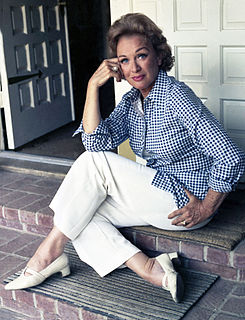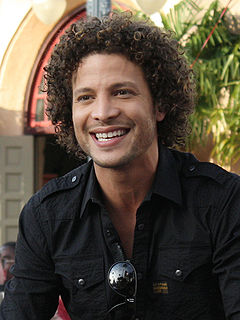A Quote by Truman Capote
She was a triumph over ugliness, so often more beguiling than real beauty, if only because it contains paradox. In this case, as opposed to the scrupulous method of good taste and scientific grooming, the trick had been worked by exaggerating defects; she'd made them ornamental by admitting them boldly.
Related Quotes
She was obviously useful at the UN because she had a public persona before she ever got there. She was well known. She was a spokeswoman for many important things. When she got there, what she said was paid attention to, undoubtedly much more than would have been if just Joe Blow had been made our representative to the United Nations. In that sense, I think it was useful to have her there.
...fact was she knew more about them than she knew about herself, having never had the map to discover what she was like. Could she sing? (Was it nice to hear when she did?) Was she pretty? Was she a good friend? Could she have been a loving mother? A faithful wife? Have I got a sister and does she favor me? If my mother knew me would she like me? (140)
It is an important distinction to note that she looked not only as if she had taken good care of herself, but that she had good reason to have done so. (...) She looked to be in such total possession of her life that only the most confident men could continue to look at her if she looked back at them. Even in bus stations, she was a woman who was stared at only until she looked back.
The confidence in the unlimited power of science is only too often based on a false belief that the scientific method consists in the application of a ready-made technique, or in imitating the form rather than the substance of scientific procedure, as if one needed only to follow some cooking recipes to solve all social problems. It sometimes almost seems as if the techniques of science were more easily learnt than the thinking that shows us what the problems are and how to approach them.
Yet losing him seemed unbearable. He was the one she loved, the one she would always love, and as he leaned in to kiss her, she gave herself over to him. While he held her close, she ran her hands over his shoulders and back, feeling the strength in his arms. She knew he’d wanted more in their relationship than she’d been willing to offer, but here and now, she suddenly knew she had no other choice. There was only this moment, and it was theirs.
Whenever an occasion arose in which she needed an opinion on something in the wider world, she borrowed her husband's. If this had been all there was to her, she wouldn't have bothered anyone, but as is so often the case with such women, she suffered from an incurable case of of pretentiousness. Lacking any internalized values of her own, such people can arrive at a standpoint only by adopting other people's standards or views. The only principle that governs their minds is the question "How do I look?
Those were the people who made her something, and without them she was different. She'd held on to them and to that old self tenaciously, though. She clung to it, celebrated it, worshipped it even, instead of constructing a new grown-up life for herself. For years she'd been eating the cold crumbs left over from a great feast, living on them as though they could last her forever.
Madame Ratignolle hoped that Robert would exercise extreme caution in dealing with the Mexicans, who, she considered, were a treacherous people, unscrupulous and revengeful. She trusted she did them no injustice in thus condemning them as a race. She had known personally but one Mexican, who made and sold excellent tamales, and whom she would have trusted implicitly, so soft-spoken was he. One day he was arrested for stabbing his wife. She never knew whether he had been hanged or not.
She felt a stealing sense of fatigue as she walked; the sparkle had died out of her, and the taste of life was stale on her lips. She hardly knew what she had been seeking, or why the failure to find it had so blotted the light from her sky: she was only aware of a vague sense of failure, of an inner isolation deeper than the loneliness about her.
As she had been walking from the ward to that room, she had felt such pure hatred that now she had no more rancor left in her heart. She had finally allowed her negative feelings to surface, feelings that had been repressed for years in her soul. She had actually FELT them, and they were no longer necessary, they could leave.




































